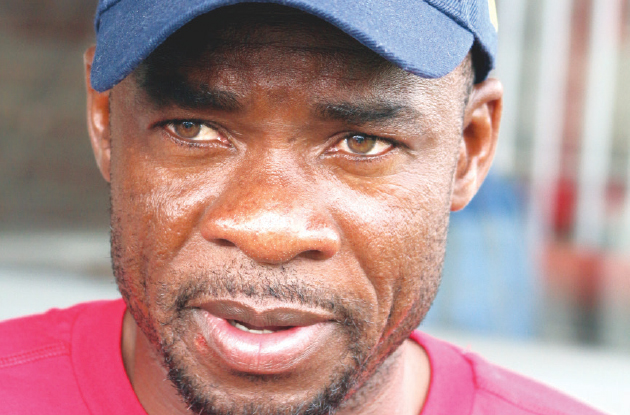Destitution stalks workers as Hwange Colliery flounders

Kamangeni Phiri
ANXIETY and uncertainty has gripped Hwange Colliery Company’s workers as the ailing coal giant struggles to stay on its feet. Each month the workers see the Messenger of Court attaching the Colliery Company equipment over unpaid debts. Hwange is facing litigation for claims amounting to $20,6 million while cases worth $20,1 million have been awarded against it.
“The Colliery is dying. Workers are putting 120 percent in performing their duties but the company isn’t paying them salaries. They’re producing and they’re asking where the money realised from coal sales is going,” said a worker, Joseph Banda.
“Workers are going to work every day but at times find themselves with nothing to do once they get there. It’s not their problem if the employer doesn’t give them work to do.”
Each passing month is adding on to the workers’ torture. They are owed 30 months’ salaries but they keep hoping their employer will eventually pay them.
Workers say the Colliery Company management made an arrangement to pay each worker $200 every month regardless of grade.
But this is not happening.
“Waiting for a regular salary at the Colliery is like waiting for the rain. We’ve not been paid for some time and the company only gave us $200 each after four months. How do you budget $200 in four months?” asked Banda.
A member of the workers’ committee says unfortunately most workers cannot borrow because they lack the capacity to service their debts.
Driven by hunger, a number of women are leaving their matrimonial beds at night to sell their bodies to truck drivers and raise the odd dollar.
“We can’t borrow money because we can’t afford to pay it back. Besides, not many are willing to give us soft loans. Some of our colleagues are now going to their rural homes to sell their livestock in a bid to survive. Families are breaking as some married women are forced into prostitution to fend for their children. They go to Truck Inn at night to sell their bodies to truck drivers. The women are desperate as they’ve kids to take care of. This has resulted in divorces occurring at a high rate,” said the workers committee member.
He says some workers are forced to report for duty on empty stomachs.
Some workers whose children attend school outside the Colliery are struggling to pay fees.
“We don’t know how most workers are surviving. There are families who can go for a day without food. We’re also failing to pay fees for our kids but no one has been chased yet because some of the schools belong to the Colliery Company. But some of us have kids at boarding schools which aren’t under the Colliery,” said the workers’ committee member.
Hwange coal has a ready market locally, in Zambia and the DRC. However, production levels remain low although workers report for duty daily.
Some employees are leaving the Colliery Company in droves to join rival coal companies like Makomo Resources which is in the same town.
“Most workers who are leaving are those with skills needed by the new coal companies. We’ve lost about 19 operators to the rival companies. This affects production. We can’t employ because the company isn’t paying. Ironically, the workers joining rival companies continue living in Hwange Colliery houses and the company can’t kick them out of its houses because it owes them money,” said a worker who chose to remain anonymous.
Workers who are resigning and companies owed by Hwange Colliery are instituting litigation against the coal company as a way of recovering their monies.
Colliery workers representatives say litigation is also chewing the little money coming from production.
“This also explains why the company is failing to pay us the $200 per month allowance it promised us. Some workers are resigning after realising that only people who quit get paid. They’re resigning in large numbers and suing the company,” said a worker.
The Messenger of Court in January attached office furniture worth $2 million which included desks, cabinets, office chairs, computers and computer accessories at HCC’s office in Harare towards settlement of the debt. The coal company had failed to pay about $2 million for the installation and use of software in breach of contracts the company signed with three software providers, Ventyx International (Proprietary) Limited, ABB South Africa (Proprietary) Limited and ABB Technology Limited.
Last December the Messenger of Court attached the company’s movable assets after it failed to pay Wiltshire Explosives (Pvt) Ltd, Renaissance Merchant Bank, Shepco Industrial Supplies and one Themba Sibanda. The attached property included six front-end loaders, seven vehicles, cranes, excavators, trailers, dozers, among other properties.
These are just but a few of the many legal battles the colliery company is facing in its effort to remain afloat.
Some committed workers are working out ways to ward-off litigations and save their beloved company.
In April they proposed that the Colliery Company be placed under Judicial Management but the move was rejected by the major-shareholder, the government.
“Workers representative bodies like the workers’ committee and the Associated Mine Workers Union of Zimbabwe (AMWUZ) now want to take the litigation route to save the company. We’re suing the company for non-payment of salaries among other things. This is our way of stopping outsiders from taking the equipment we need to sustain operations. As workers we’re worried that we will wake up one day to find that there’ll be no company to work for. Equipment is being attached and auctioned. It’s our rivals who buy most of the equipment,” said a worker, Joseph Phiri.
The developments are coming just after the company had secured the new machinery under a government-facilitated vendor financed scheme through the PTA-BELAZ facility and BEML.
The deal saw the colliery receiving 10 dumpster trucks, five front-end loaders, two wheel dozers, two excavators, two water bowsers, three front-end loaders, three bulldozers, three drill rigs, a motor grader and one tyre handler supplied by Indian firm, BEML.
In September last year, the company reported it had widened its half year losses by more than 90 percent to $15,6 million as sales plummeted.
HCCL has a legacy debt of about $160 million.
However, HCCL Managing Director, Thomas Makore remains optimistic the giant mining concern can be turned around.
“The Colliery has a bright future. The future has to be realised, however. It shouldn’t remain a potential. We received new open cast equipment from Belarus and India. The excavators from India weren’t performing to expectation, they had technical faults. Suppliers have since repaired them. They’re working now. But this affected production when they were down,” he said.
Makore, who acknowledges HCCL is not doing well, says management has identified a number of strategies to turn the company around.
He says HCCL needs $200 million to fully recapitalise.
“The Company is in a bad shape not because of yesterday but because of things that happened over a period of time. We’re working with our principals to turn around the company. Major shareholder has been supportive. We’ve been granted new concessions. There are new coal deposits in Lubimbi West and East, 80km from here going towards Lupane. There’s also coal bed methane gas in Lupane. Like I said, the future is bright. Working capital is our biggest challenge. We need to pay salaries and other operational expenses. We applied for a loan but it’s yet to be approved. We need the money to turn around. The turnaround programme is firmly on track,” he said.
Makore says coal was a sought-after commodity as it was a source of energy that drives economies the world over.
He says the colliery needed to come up with ways of reducing operating costs while at the same time containing competition offered by new companies like Makomo Resources.
“We need to reduce costs and work hard. Our competitors have started without much costs at our expense. They started at a shallow level which is cheaper to mine while we’re mining deep which is more expensive. We’re now looking at broadening our markets. We’re looking into Botswana, Zambia, South Africa and the DRC.
‘‘We hired Portuguese firm, Mota-Engil, who’ve their own machinery because our machinery is old. Mota-Engil are specialists in open cast mining. They bring their own equipment and we pay them as we work. That way we cut costs,” said Makore.
He says HCCL will be reducing its management team and selling houses to workers as a way of off-setting salary arrears. Workers are owed $20 million in salary arrears.
“We owe our creditors $100 million, excluding staff. We owe the government a lot of money. They approved that we convert debt of $69 million into equity. This will happen through rights issued through the stock exchange. This means government’s shareholding will increase. Other shareholders will have to inject money into the company, if they fail, government will become an even bigger shareholder,” he said.
Turning around the fortunes of the Hwange Colliery Company could be an uphill task but the workers remain optimistic hence most of the employees preferred to withhold their names for fear of losing their jobs.











Comments